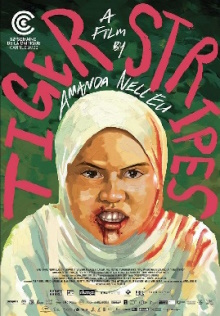My wife wanted to watch this local film for the longest time due to the international accolades it won. Yet when it was finally screened in Malaysian cinemas, it was censored so badly that this version was disavowed by its director Amanda Nell Eu. Fortunately for us, it’s now available on Netflix so we can see for ourselves both why it has a 100% rating on Rotten Tomatoes and why the Malaysian government is uneasy about it. I am in awe of the director’s ability to coax such strong performances out of its young, untrained performers and her courage in confronting the problems of female puberty in a conservative society. It struggles to land its ending but I can understand what the director is going for so it works out alright.
Zaffan is a somewhat rebellious Malay girl who goes to an all girl school with her friends Farah and Mariam. All three girls wear the Islamic tudung head covering but Zaffan often takes hers off to relax and she also likes to make videos of herself dancing for social media. Farah is the strictest of the three and sometimes accuses Zaffan of lacking piety when the latter’s antics go overboard. When Zaffan gets her period for the first time, she becomes confused and scared like any other girl. She is unable to attend prayer sessions and the other girls ostracize her, claiming that she smells bad and is disgusting. After hearing a story about a girl who transformed into a tiger and ran off into the jungle, Zaffan finds herself transforming as well. Lesions grow on her skin in a vaguely tiger stripe pattern. Her fingernails start to fall off. She takes to wearing long sleeved blouses and gloves to hide the physical changes from everyone else including her parents. She occasionally sees a tiger-like wild woman perched on a tree branch. When her friends join the girl scouts, she becomes even more distant from them. She joins the scout troop as well but during an overnight camping trip near the jungle, eerie things happen that affect the other girls as well. Eventually the girls and even a female teacher at school are struck by hysteria when Farah confronts Zaffan in the school toilet.
I’ve written before that female puberty is an underserved topic in film so it’s great to see one that not only talks about it in the context of a conservative Muslim society but also links the biological changes with body horror. Add in a good dose of bullying in school, youthful yearning for freedom and independence, and a social media savvy bomoh who claims to be able to cure Zaffan with a magic ritual and you have the makings of a strong film. I don’t know where the director managed to dig up the girl Zafreen Zairizal who plays Zaffan but she is amazing here, the perfect mix of impish charm, rebellious sullenness and boisterous enthusiasm. The film leaves it ambiguous whether there really is some supernatural element to what is going and how real Zaffan’s physical transformation actually is. The ending is a little awkward as it’s a kind of want your cake and eat it too situation. Still, it is very satisfying to watch and even with a visibly limited budget, succeeds in showing the audience what a preteen girl who suddenly develops superstrength and agility and a propensity for violence, in a Malaysian kampung would be like.
I can’t gush enough about how authentically Malaysian this feels, over and above the recent spate of other films. Zaffan and her friends make for believable people who live in the real Malaysia of today, not some idealized version that exists only in propaganda. They make TikTok videos, play very roughly, imperfectly comply with Islamic teachings and so on. Hysteria attacks are something that really does pop up in the news here every so often. It would have been awful if the director had played it straight and portrayed the exorcist the school authorities brought in as being actually effective. Instead, he’s a buffoon who’s hungry for social media views and is annoyingly condescending. Perfect. The film even makes some nods to some everyday realities of Malaysian society that few like to talk about even in fiction, such as when the school’s headmistress castigates the assembled students that it shouldn’t be Chinese students who are at the top of the class every year. In the interests of avoiding a neatly packaged happy ending, Zaffan’s fate is left as an open question and that is far better than the other Malaysian films we’ve watched.
The other films may have their strong points but ultimately almost all are good only within the smaller arena of Malaysian cinema. This is one of the rare Malaysian films that I would recommend to my US friends for example and fully expect them to understand and enjoy it. The fact that the Malaysian government is uncomfortable with showing that there are fun-loving Muslim girls out there who feel constricted by the limits placed on them is all the more reason to like and support this kind of artistic expression.
